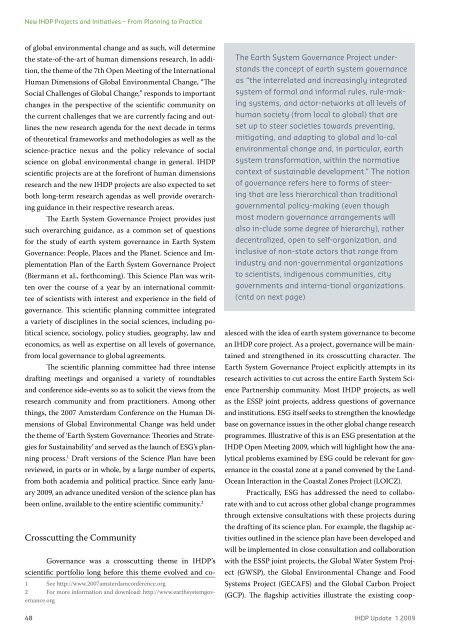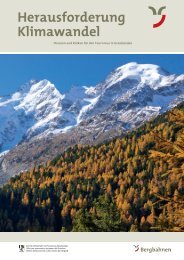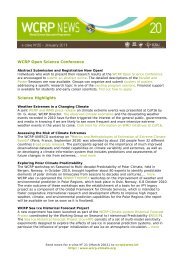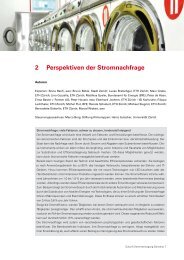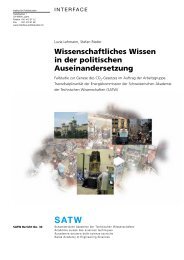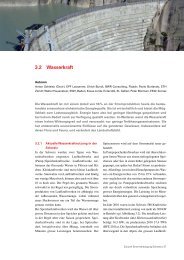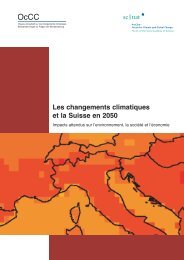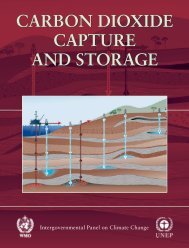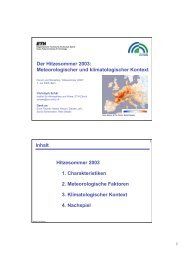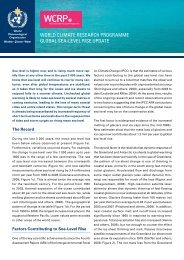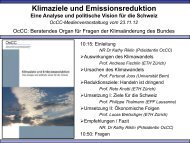Open - IHDP - United Nations University
Open - IHDP - United Nations University
Open - IHDP - United Nations University
Create successful ePaper yourself
Turn your PDF publications into a flip-book with our unique Google optimized e-Paper software.
New <strong>IHDP</strong> Projects and Initiatives – From Planning to Practice<br />
of global environmental change and as such, will determine<br />
the state-of-the-art of human dimensions research. In addition,<br />
the theme of the 7th <strong>Open</strong> Meeting of the International<br />
Human Dimensions of Global Environmental Change, “The<br />
Social Challenges of Global Change,” responds to important<br />
changes in the perspective of the scientific community on<br />
the current challenges that we are currently facing and outlines<br />
the new research agenda for the next decade in terms<br />
of theoretical frameworks and methodologies as well as the<br />
science-practice nexus and the policy relevance of social<br />
science on global environmental change in general. <strong>IHDP</strong><br />
scientific projects are at the forefront of human dimensions<br />
research and the new <strong>IHDP</strong> projects are also expected to set<br />
both long-term research agendas as well provide overarching<br />
guidance in their respective research areas.<br />
The Earth System Governance Project provides just<br />
such overarching guidance, as a common set of questions<br />
for the study of earth system governance in Earth System<br />
Governance: People, Places and the Planet. Science and Implementation<br />
Plan of the Earth System Governance Project<br />
(Biermann et al., forthcoming). This Science Plan was written<br />
over the course of a year by an international committee<br />
of scientists with interest and experience in the field of<br />
governance. This scientific planning committee integrated<br />
a variety of disciplines in the social sciences, including political<br />
science, sociology, policy studies, geography, law and<br />
economics, as well as expertise on all levels of governance,<br />
from local governance to global agreements.<br />
The scientific planning committee had three intense<br />
drafting meetings and organised a variety of roundtables<br />
and conference side-events so as to solicit the views from the<br />
research community and from practitioners. Among other<br />
things, the 2007 Amsterdam Conference on the Human Dimensions<br />
of Global Environmental Change was held under<br />
the theme of ‘Earth System Governance: Theories and Strategies<br />
for Sustainability’ and served as the launch of ESG’s planning<br />
process. 1 Draft versions of the Science Plan have been<br />
reviewed, in parts or in whole, by a large number of experts,<br />
from both academia and political practice. Since early January<br />
2009, an advance unedited version of the science plan has<br />
been online, available to the entire scientific community. 2<br />
Crosscutting the Community<br />
Governance was a crosscutting theme in <strong>IHDP</strong>’s<br />
scientific portfolio long before this theme evolved and co-<br />
1 See http://www.2007amsterdamconference.org<br />
2 For more information and download: http://www.earthsystemgovernance.org<br />
The Earth System Governance Project understands<br />
the concept of earth system governance<br />
as “the interrelated and increasingly integrated<br />
system of formal and informal rules, rule-making<br />
systems, and actor-networks at all levels of<br />
human society (from local to global) that are<br />
set up to steer societies towards preventing,<br />
mitigating, and adapting to global and lo-cal<br />
environmental change and, in particular, earth<br />
system transformation, within the normative<br />
context of sustainable development.” The notion<br />
of governance refers here to forms of steering<br />
that are less hierarchical than traditional<br />
governmental policy-making (even though<br />
most modern governance arrangements will<br />
also in-clude some degree of hierarchy), rather<br />
decentralized, open to self-organization, and<br />
inclusive of non-state actors that range from<br />
industry and non-governmental organizations<br />
to scientists, indigenous communities, city<br />
governments and interna-tional organizations.<br />
(cntd on next page)<br />
alesced with the idea of earth system governance to become<br />
an <strong>IHDP</strong> core project. As a project, governance will be maintained<br />
and strengthened in its crosscutting character. The<br />
Earth System Governance Project explicitly attempts in its<br />
research activities to cut across the entire Earth System Science<br />
Partnership community. Most <strong>IHDP</strong> projects, as well<br />
as the ESSP joint projects, address questions of governance<br />
and institutions. ESG itself seeks to strengthen the knowledge<br />
base on governance issues in the other global change research<br />
programmes. Illustrative of this is an ESG presentation at the<br />
<strong>IHDP</strong> <strong>Open</strong> Meeting 2009, which will highlight how the analytical<br />
problems examined by ESG could be relevant for governance<br />
in the coastal zone at a panel convened by the Land-<br />
Ocean Interaction in the Coastal Zones Project (LOICZ).<br />
Practically, ESG has addressed the need to collaborate<br />
with and to cut across other global change programmes<br />
through extensive consultations with these projects during<br />
the drafting of its science plan. For example, the flagship activities<br />
outlined in the science plan have been developed and<br />
will be implemented in close consultation and collaboration<br />
with the ESSP joint projects, the Global Water System Project<br />
(GWSP), the Global Environmental Change and Food<br />
Systems Project (GECAFS) and the Global Carbon Project<br />
(GCP). The flagship activities illustrate the existing coop-<br />
48 <strong>IHDP</strong> Update 1.2009


